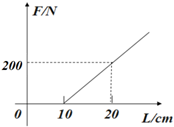问题
问答题
某轻质弹簧的弹力F与弹簧长度L的关系如图所示.一木箱重200N,静止放在水平面上.用该弹簧沿水平方向拉木块,当弹簧的伸长量为8cm时,木箱刚好被拉动.已知木箱与地面间的最大静摩擦力和滑动摩擦力相等.求:
(1)该弹簧的原长L0以及劲度系数k;
(2)木箱与水平面间的动摩擦因数;
(3)当弹簧的伸长量为4cm时,求木箱受到的摩擦力的大小.

答案
(1)弹簧的弹力为零时,弹簧处于原长,为10cm;
劲度系数:k=
=△F △x
=2000N/m;200-0 0.20-0.10
(2)当弹簧的伸长量为8cm时,木箱刚好被拉动,拉力为:
F=kx=2000×0.08=160N
木箱刚好被拉动,故最大静摩擦力等于拉力,为160N;
木箱与地面间的最大静摩擦力和滑动摩擦力相等,故滑动摩擦力为160N;
根据f=μmg,有:
μ=
=f mg
=0.8160N 200N
(3)当弹簧的伸长量为4cm时,拉力为:
F=kx=2000×0.04=80N
由于拉力小于最大静摩擦力,故拉力不动,静摩擦力为80N;
答:(1)该弹簧的原长为10cm,劲度系数k为2000N/m;
(2)木箱与水平面间的动摩擦因数为0.8;
(3)当弹簧的伸长量为4cm时,木箱受到的摩擦力的大小为80N.

